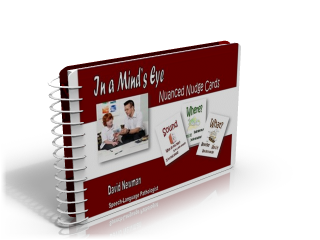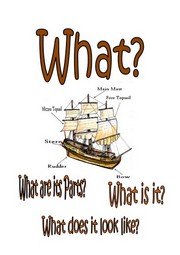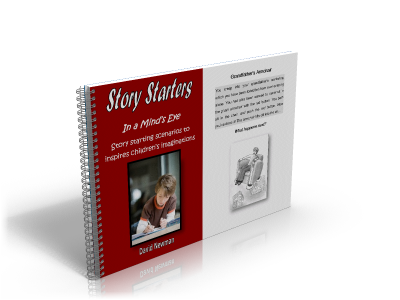
New Free Activity 21/05/2017!
Ignite your
Students’ Imaginations – over 100 Original Narrative Scenarios to Explore
A special feature of the Story Starters resource is the range, clarity and depth of vision that
the individual scenarios explore.
The scenarios give students access to a series of plots
and storylines, that can be used either as a story starting devices or explored as oral language activities.
This means that you and your students will never run out of topics to pursue. What’s more, the free
bonuses are specifically designed to prompt and prod your students to explore abilities
that may lie dormant within them.
Each Scenario has an Inbuilt Call to
Action
Students are presented with opportunities to respond to events in a variety of ways.
For instance…
Imagine you’re a mouse. You’re about to steal cheese from a kitchen table. You sense movement in the
kitchen. You look over the edge of the the table and look down. It’s a cat! It hasn’t seen you yet,
but it can smell your presence. It’s searching for you.
What happens next?
What in fact would happen next if you’re a mouse nimbly eating cheese
from a kitchen table, while below a cat searches for you?
What do you, a tiny creature, do to save
yourself? Do you run to the nearest mousehole,
attempt to stealthily sneak past the cat, or do you do something completely unexpected?
Your students’ responses to this situation may surprise you.
Importantly, built into this scenario is the seed of an exciting story. The bonus worksheets –
that you receive with the program – are designed to scaffold and shape your students first tottering steps
on the exciting journey of building and writing their own stories.
The ‘How would that feel?’scenarios
are unique. Your students will have a visceral and deeply felt
response to the ‘How would that feel?’ narratives. This happens because your students are
placed in the moment, and are prompted to feel a variety of rich sensory experiences.
Take this scenario for example…
‘Imagine you’re a wild horse.
You gallop across a large, open field. You are galloping so fast that your hooves thunder across the
ground and your mane and tail stream behind you, rippling in the wind.’
How would that feel?
Well, how would that feel? Can you imagine and sense what it is to be a wild horse at full gallop?
You can feel the strength in your legs, the pounding of your mighty beating heart, the sound of
your pounding hooves, and the wind rippling your mane, can’t you?
Perhaps the most popular scenarios, and the questions students tend to enjoy the most are the ‘Which do you choose and why? narratives. These scenarios position your students in a difficult
hypothetical situation and prompt them to choose a course of action.
For instance…
‘Imagine you’re a wizard in a fantasy story.
You possess powerful magic. You need it as you battle the golden dragon. You must choose between a spell
that puts the dragon into a brief sleep, or a spell that causes its fire-breath to fizzle out.’
Which do you choose and why?
The student is required to think about the implications
of his or her actions. If the student chooses to put the dragon into a brief sleep, just how long will
the dragon sleep for? Also, the dragon will still be very dangerous when it does happens to wake up.
Or, if the student
selects the spell to fizzle out the dragon’s fire breath, then the wizard still has to contend with the dragon’s
teeth and claws.
Quite apart from the
question of which course of action to choose, there are also words such as brief, fizzle, possess, etc,
and the meaning of these words within the context of the scenario.
The Scenarios Branch into Five
Categories
- The Natural World: The natural world is a place of tooth and claw, but also of incomparable beauty.
- Science Fiction and Fantasy: Multiple worlds and unlimited situations, which are designed to fire students’ imaginations.
- Flights of Fancy: these scenarios drop students into extraordinary situations to which they have to respond.
- In History’s Pages: These scenarios place the student in the head space of a character sometime in Earth’s history.
- What if..?: These scenarios ask the student to imagine a possible future, which they may encounter.
Bonus resource: Nuanced Nudge Cards
Click on the image to download the Nuanced Nudge cards

The Nuanced Nudge cards are eight beautiful illustrations that prompt students with
where, what, who, when, what color questions.
The pictures can be cut out,
attached to card, or laminated. Or the cards can simply be read from the sheet.
The cards will enhance your students’ capacity to adequately answer
complex questions.

This happens because your students will have increased opportunities to practice their expressive language skills.
The cards are designed to increase the complexity of your students’ verbal response.
Bonus 2: Worksheets
The In a Mind’s Eye worksheets are graphic equalizers that feature worksheets to
help scaffold your students’ responses to the primary question types: ‘What happens next?’, ‘How
would that feel?’ and ‘Which would you choose and why?’.
The worksheets are an excellent way to help shape and scaffold your students’ written language responses
to the In a Mind’s Eye scenarios.
For instance, the ‘What happens next?’ scenarios, as explained previously, are the seed of an exciting narrative.
The worksheets have the necessary blackline masters to guide your students in developing and writing their own stories.
Click on the image to access the worksheets

Click on the image to access the free Story Starters Program

Updated 05/2017










